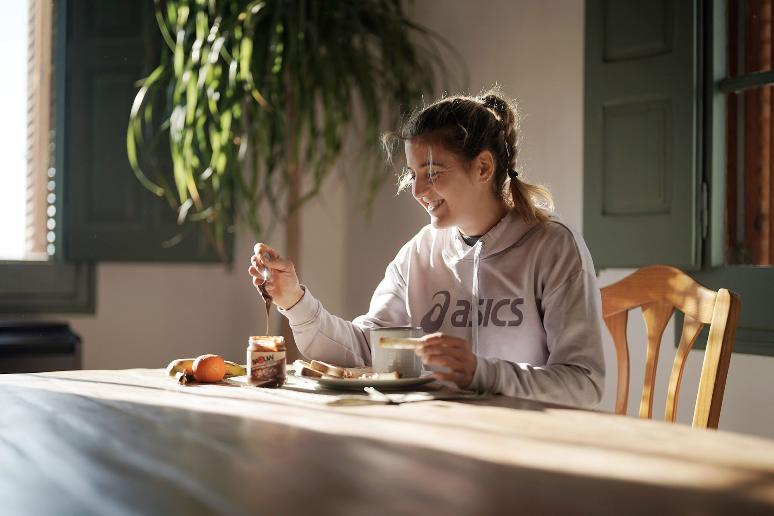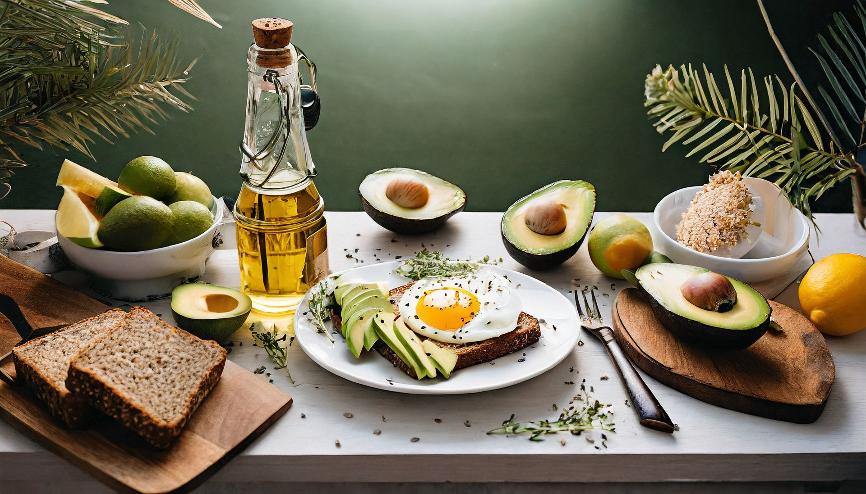In sports nutrition, breakfast is essential to get the day off to a good start, and we at Baouw are convinced of this too. This is especially true for sportspeople, who have greater functional needs and must ensure that they eat a healthy, high-quality diet every day if they are to perform at their best. Here we give you some key principles and breakfast ideas for your sports nutrition. If you want to be fit from the start of your day and provide all the nutrients your body needs at that time.
YOUR HEALTHY, HIGH-PROTEIN SPORTS BREAKFAST
1. Salty!
Although we're used to eating rather sweet breakfasts, such as the classic bread, butter and jam, accompanied by fruit juice and a pastry, it would seem that this pattern is far from natural and effective in providing the energy our bodies need to get through the day. We advise you to eat a breakfast with a high protein and savoury component to avoid the effects of sugar, which, by raising blood sugar levels, leads to excessive insulin secretion in the morning. Eating a low-sugar or even savoury breakfast will help you avoid cravings later in the day.
Example of a savoury protein dish: 2 fried eggs and a slice of avocado on wholemeal bread
2. Reassuring and appetising!
For a satiating breakfast, it is important to consume protein combined with fat. Of course, you should choose quality fats such as avocados, cheeses and oilseeds. These will also allow you to fill up on vitamins, minerals and satiety-enhancing fibre. If that sounds like a lot and you're worried that you're not hungry enough, here are two little tips to help you. Avoid eating too much in the evening or too late, so that you can digest properly and get to breakfast with a healthy appetite. Secondly, your breakfast should also make you want to eat! Mix flavours that you like and that you digest well. Forcing yourself to eat unappetising foods may not make it easy to get into the habit.
Example of a satiating and appetising breakfast: Chia seeds, almonds and fruit covered in Baouw spread with no added sugar!
3. Balanced, simple and fast!
To avoid having to think too much early in the morning, try setting up a routine by preparing the ingredients the night before, or simplify your morning preparations with simple, raw foods. This will save you time and give you a stress-free start to the day, while allowing you to really take the time to eat:
- Prepare your seed mixture in advance with, for example: pumpkin seeds, flax seeds, sunflower seeds and oilseeds (almonds, hazelnuts, cashews).
- Prepare your omelette or ham and cheese quiche in the evening, so you only have to heat it up in the morning. These protein-rich options will give you a good source of energy for the morning!
- If you really don't have time to make yourself breakfast, Baouw has compotes that you can use as a topping in your bowl instead of fruit and a Baouw organic protein bar. These are good alternatives, even if they should be used occasionally, so that you can eat a full breakfast whenever possible.
THE FOODS TO CHOOSE FOR A COMPLETE, SATIATING BREAKFAST
1. Why choose quality lipids?
Although carbohydrates are the body's most easily accessible source of energy, ‘good fat’ (lipids) provides a more concentrated source of energy, which is essential for endurance athletes. As carbohydrate stores diminish rapidly and are difficult, if not impossible, to replenish entirely during exercise, it is important for athletes to learn to switch to their fat reserves. Over and above all the health benefits associated with eating fat rather than carbohydrates, it also helps the body get used to switching from one reservoir to the other. Having said that, if we now want to be more precise and respect the principles of chrononutrition (eating the right foods at the right time of day), we need to focus on eating a breakfast based on quality fats (oilseeds, olive oil, oily fish, etc.), which are essential for waking up our brains and neurons. Why in the morning? Because the secretion of ‘lipases’, enzymes specialising in the digestion of fats, is at its peak in the morning. We should also give priority to sources of omega-3 (walnut oil, rapeseed oil, linseed oil, oilseeds, oily fish, etc.), which are often overlooked in our diets and yet are fundamental to the proper functioning of the cardiovascular, cerebral, inflammatory and hormonal systems, etc. If you'd like more information on omega-3 and omega-6, take a look at our article on the subject.
Examples of good sources of fat for breakfast: avocados, oilseeds (walnuts, hazelnuts, almonds, cashew nuts, etc.), fresh goat's or sheep's cheese.
2. Proteins, as complete as possible in amino acids.
Proteins, which are better digested in the morning, are essential because they play a vital role in the production of dopamine. Dopamine is a neurotransmitter with numerous benefits. It promotes alertness, motivation and digestion. It also manages your appetite. Proteins are also essential for muscle growth, repair and recovery. The link with sport is therefore made very quickly, as athletes need more protein than the average person, to support muscle development and repair tissues damaged during sport. Eating a protein-rich breakfast can help to kick-start this muscle rebuilding process, so that you can resume training more quickly. The source of protein can be :
- Either animal: eggs, ham, white meat, dairy products
- Or plant-based: tofu, chia seeds, oilseeds, pulses, etc.
Good to know: eggs are richer in protein when they are fried or boiled, the yolk should be runny (undercooked) and the white firm (cooked).
3. Complete carbohydrates with a low glycaemic index (GI)!
Despite everything we have said above, carbohydrate intake cannot be ruled out. On the other hand, you should opt for low or moderate GI foods! We won't go into too much detail on the glycaemic index in this article, as we have plenty of content on the subject on our blog dedicated to sports nutrition. However, to sum up, if the glycaemic index is too high, the body may not be able to use fats correctly for energy, and this could be the cause of the famous ‘energy crash’ that haunts sportsmen and women. If you're used to eating white bread (high GI), you can switch to other breads such as wholemeal or sourdough bread. Finally, complex carbohydrates, such as wholegrain cereals, fruit and vegetables, are preferable to simple carbohydrates for sportspeople. They are rich in fibre and essential nutrients, and enable us to use our energy more efficiently.
Examples of low-GI carbohydrate foods: sweet potatoes, quinoa, almonds, wholemeal bread, pulses (lentils, chickpeas, kidney beans, etc.), etc.
5 SPORTS BREAKFAST RECIPE IDEAS
Wholemeal bread with avocado:
- Ingredients: slices of wholemeal bread (sourdough if possible), avocado, extra virgin olive oil. .
- Benefits: healthy fats from the avocado, complex carbohydrates from the bread, fats from the olive oil.
Spinach and feta omelette:
- Ingredients: egg, spinach, feta cheese and extra virgin olive oil.
- Benefits: protein from the egg and feta, vitamins from the spinach, fat from the olive oil.
Fried egg & hummus :
- Ingredients: fried egg, chickpea purée and olive oil.
- Benefits: protein from eggs and chickpeas.
Chia pudding with fruit:
- Ingredients: chia seeds, almond powder, almond milk, chopped fruit. Enhance with Baouw protein spread, which is very easy to digest, or an oilseed puree.
- Benefits: protein and fibre from the chia seeds and spread, vitamins from the fruit, fat from the olive oil.
Blueberry Muffins :
- Ingredients: lupin flour, bilberries, plain yoghurt, eggs.
- Benefits: antioxidants from blueberries, proteins from yoghurt, eggs and lupin flour.
(Bonus) Breakfast by Baouw
- Ingredients: 90g puree and a 25g bar or an Extra 50g bar for optimal digestion.
- Contribution: carbohydrates from the purées, proteins from the bars. Easy digestion and satiating recipes.
Note that these recipe ideas give you a concrete idea of what your body needs. So don't hesitate to adapt these recommendations to suit your budget and tastes!
A final word
Breakfast is a crucial meal for everyone. It must include a combination of proteins, quality fats, complex carbohydrates, vitamins and minerals. To provide the fuel needed to optimise performance and support overall health. Thanks to our nutritionists Benoît Nave and Jodie Penetro for writing this article.









